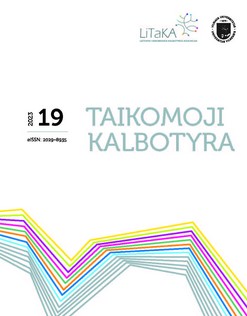Kazachstano lietuvių kilmės diasporos saitai su lietuvio etnine tapatybe ir lietuvių kalba
Lithuanian-Origin Diaspora in Kazakhstan: Exploring Connections to Ethnic Identity and the Lithuanian Language
Author(s): Loreta VilkienėSubject(s): Baltic Languages, Migration Studies, Ethnic Minorities Studies, Identity of Collectives
Published by: Vilniaus Universiteto Leidykla
Keywords: Diaspora of Lithuanian Origin in Kazakhstan; ethnic identity; the Lithuanian language; identity navigation model;
Summary/Abstract: This article focuses on the diaspora of Lithuanian origin in Kazakhstan, examining their ties to Lithuanian ethnic identity and the Lithuanian language. This research aims to answer the question of which strategies three generations of the target diaspora have employed to maintain Lithuanian identity and the Lithuanian language. Also, the paper explores the reasons that influenced specific decisions and behaviours within the target diaspora. The research material consists of 29 qualitative semi-structured interviews collected in November 2021 during an expedition in Kazakhstan. These interviews were analysed from a qualitative perspective using Bamberg’s (2011) Narrative Practice and Identity Navigation model adapted for the purposes of the present study. The analysis of the Lithuanian-origin diaspora in Kazakhstan has revealed that over three generations, they have preserved their Lithuanian ethnic identity and expressed favorable attitudes towards Lithuanianness, Lithuania, and Lithuanians. However, the Lithuanian language, not necessarily considered integral to the ethnic identity of the target group, has not been maintained. It can be observed that the second generation does not know the Lithuanian language. However, the third generation shows a more active relationship with the Lithuanian language and wants to learn it. There are various reasons why the Lithuanian language is not being transmitted to the next generations, including: 1.) the consequences of social trauma, such as the abandonment of the first generation’s language as a survival strategy and state policies promoting Russification; 2) the formation of mixed families of deportees, 3.) conflicts between the first generation and their relatives in Lithuania, leading to broken contacts and reduced possibilities for communication in Lithuanian; a lack of available Lithuanian-speaking individuals to communicate with due to the absence of larger Lithuanian communities; and 4) the pursuit of economic prosperity and integration, particularly for those who voluntarily migrated to Kazakhstan.
Journal: Taikomoji kalbotyra
- Issue Year: 2023
- Issue No: 19
- Page Range: 99-121
- Page Count: 23
- Language: Lithuanian

